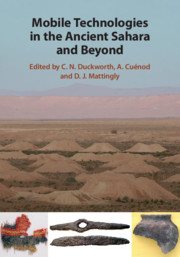Book contents
- Mobile Technologies in the Ancient Sahara and Beyond
- The Trans-Saharan Archaeology Series
- Mobile Technologies in the Ancient Sahara and Beyond
- Copyright page
- Contents
- Figures
- Tables
- Contributors
- Preface
- Part I Introduction
- Part II Technological Mobility and Transfers
- Part III Metallurgy
- Part IV Glass Technology
- Part V Handmade Pottery
- Part VI Conclusion
- 14 Technology in the Sahara and Beyond
- Index
- References
14 - Technology in the Sahara and Beyond
Concluding Discussion
from Part VI - Conclusion
Published online by Cambridge University Press: 18 September 2020
- Mobile Technologies in the Ancient Sahara and Beyond
- The Trans-Saharan Archaeology Series
- Mobile Technologies in the Ancient Sahara and Beyond
- Copyright page
- Contents
- Figures
- Tables
- Contributors
- Preface
- Part I Introduction
- Part II Technological Mobility and Transfers
- Part III Metallurgy
- Part IV Glass Technology
- Part V Handmade Pottery
- Part VI Conclusion
- 14 Technology in the Sahara and Beyond
- Index
- References
Summary
The concluding discussion in this chapter addresses several issues. In the first place it draws together the threads of discussion that run through the individual chapters relating to the nature of technology and technological transfer in the Sahara. It reflects on ‘what is a mobile technology?’, ‘how to study technology in the Sahara’, ‘difficulties and solutions’ and ‘connections’. The second half of the chapter broadens the discussion to consider further the implications of Saharan technology transfer in relation to the ‘and beyond’ part of our title. Finally, it examines some of the ramifications of the combined results of the four volumes of the Trans-Saharan Archaeology series for archaeologists, historians and related researchers. It presents some ideas about how the conclusions of this series offer a fresh perspective on the Trans-Saharan region and necessitate a fundamental reshaping of future agendas of study of the ancient Sahara and beyond.
- Type
- Chapter
- Information
- Mobile Technologies in the Ancient Sahara and Beyond , pp. 487 - 503Publisher: Cambridge University PressPrint publication year: 2020

